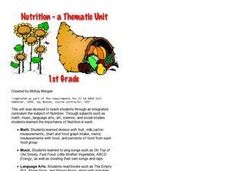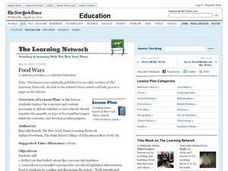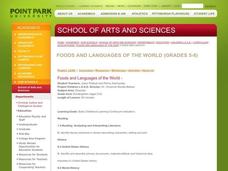California Academy of Science
Food for Thought: Defining a Problem to Find a Solution
Scholars approach a problem trying to plan a meal for a class party. They learn about the restrictions and must decide what information they need to plan the meal. The first lesson in a 13-part unit on Our Hungry Planet encourages...
Aquarium of the Pacific
Kelp Forest Conservation
There otter be a better way. As a class, groups work together to create a food web based on the organisms in the kelp forest. Budding scientists watch a video on the kelp forest to see how the organisms create a food web and hear about...
Consortium for Ocean Science Exploration and Engagement (COSEE)
Arctic Smorgasbord
Though the walrus spends roughly one third of its time on land, it eats organisms that live on the bottom of the ocean. The first in a series of five, the lesson uses a variety of plant and animal cards to have scholars build an arctic...
US Department of Agriculture
Serving Up My Plate
Offer your youngsters an extra helping of nutritional knowledge and healthy tips with this resource, which centers around the MyPlate nutritional guide and offers three "courses" of plans and worksheets on the food groups and the...
Curated OER
Nutrition: A Thematic Unit
Young learners explore nutrition and the food groups in these two mini-lesson plan ideas. First, kindergarteners have a discussion about their health and how different foods contribute to it before making their own personal food pyramid....
Curated OER
Sippin' on Smoothies
Why is calcium good for the body? Where is it stored? Young chefs discover the importance of calcium and review a list of foods that are rich in the material. They then make delicious smoothies high in calcium! Teaching kids how to make...
Baylor College
Bio Build-up
Trace pollutants through the environment in the seventh lesson of this series on the science of food. Looking at a picture of the plants and animals in an aquatic ecosystem, learners use dot stickers to represent harmful chemicals as...
Curated OER
Dietician - Nutritionist
There are so many different career opportunities in the health care field. Have learners explore what it takes to be a dietician or a nutritionist. They'll view a PowerPoint on each occupation and take mini-quizzes while they watch. A...
Curated OER
2nd Grade - Act. 17: Source Relay
Help your 2nd graders understand the difference between natural and man-made materials. They will sort breakfast food items into sources: store, factory, natural world, and farm. They will work together to classify, form conclusions, and...
Curated OER
What Does Earth Day Mean? - Biology Teaching Thesis
Students possible sources of water pollution, and explain the effects that water pollution can have on the food on the food chain. They Name human and other animal (i.e. fish) illnesses that can be contracted from drinking polluted...
Nemours KidsHealth
Food and Cooking Safety: Grades K-2
A cut and paste activity emphasizes the importance of safety precautions while cooking and baking. After reading several kid-friendly articles, class members cut 10 safety ingredients to paste on the pot's corresponding shape.
Curated OER
Food Wars
Students investigate the debate whether schools should regulate the amount or type of food and drink students consume. They write and present position papers after reading an online NY Times article.
Curated OER
Foods and Languages of the World
Students study world cultures with an emphasis on languages and cultures. In this world cultures lesson, students study the countries of Spain, China, Italy, and the United States. Students read the story Everybody Cooks Rice and move...
Baylor College
Serving Sizes
Are serving sizes for different foods always appropriate for what you need? In this hands-on activity, learners work in groups to estimate what one serving size of various foods are, and then evaluate their hypotheses by measuring real...
Curated OER
Where Does Food Come From?
Distinguish between food and non-food items. Recognize that food is obtained from both plant and animal sources. Identify sources for some common animal foods then construct a simple food path from the farm to the consumer.
Chicago Botanic Garden
Food for Thought: Climate Change and Trophic Cascades
Learners examines the arctic food web with a short video about polar bears and an article about bears and warming temperatures. They design an arctic food web and discuss the trophic cascade that could come from climate change.
Indian Land Tenure Foundation
Native Foods and Livelihoods
Introduce young scholars to the ways in which land and people have a relationship. They examine the types of food local tribes have traditionally consumed and ways in which the people and the land both benefited from the act of...
Curated OER
Lesson Plan: What We Value
How have values changed? How does our society influence our choices? Two great questions lead this discussion about food production, history, and cause-and-effect relationships. Pupils analyze a limestone relief from Assyria, research...
Curated OER
The Food Pyramid
Students determine that humans need food to function properly. In this nutrition lesson, students discuss the food categories used in the food pyramid by charting the foods eaten in one day.
Curated OER
FOOD FOR THE ANCESTORS
Learners identify the foods associated with the "Days of the Dead Celebration." They compare and contrast these foods to the foods associated with American celebrations and become familiar with the foods of Mexico and their relationship...
Curated OER
Food Allergies
Students examine food allergies as a children's health problem. In this food allergies lesson plan set, students participate in a discussion about common food allergies. They research how the immune system misfires in allergies, and...
Nemours KidsHealth
Food Allergies: Grades K-2
Learners explore different types of food allergies. In this food allergy lesson, students look at what foods people with peanut, seafood, milk, egg, soy or wheat allergies have to avoid. They create a button for a student with an allergy...
Curated OER
Figuring Out Food Labels
Students identify various sources of nutritional information and evaluate accuracy of messages. They comprehend and identify misrepresentations in current food labeling. Pupils evaluate specific consumer products for truth in labeling....
Curated OER
Healthy Foods
Students view a video which explores the following statement. "You are what you eat." They discuss the food industry, organic foods, and healthy food choices. They chart what they eat on a daily basis and make plans for healthier options.
Other popular searches
- Food Pyramid
- Food Chains
- Food Groups
- Food Webs
- Food Labels
- Food Safety
- Desert Food Chain
- Esl Lessons Food
- Animal Food Chain
- Deciduous Forest Food Chains
- Nutrition Labels
- Healthy Foods

























